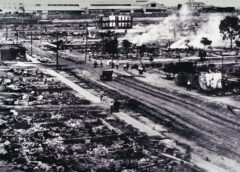
Memory should be a verb.
This year, the 100th anniversary of the Tulsa Massacre coincides with Memorial Day. For me, that begs the question: What are you willing to fight for? When it comes to Greenwood, I will fight to remember the whole story.
Tulsa Massacre
We should not let the necessary remembrance of a ruthless two-day massacre obscure the full telling of what that massacre attempted to destroy. The Greenwood District of Tulsa, OK was a thriving, self-contained Black community of approximately 10,000 residents. It was one of the most affluent African-American communities in the United States, with luxury shops, restaurants, movie theaters, grocery stores and libraries. The land – 40 acres, ironically – was bought by African-American entrepreneur O.W. Gurley who ultimately parceled and sold much of his land to other Black entrepreneurs and developers for various ventures. This place eventually became known as the Greenwood District and was dubbed the “Black Wall Street” by those who admired and those who feared what this Black community had become.
At IAAM, we are charged to tell the untold stories of the African-American experience. That said, the poet in me is quite aware that we stretch the definition of “untold” to include the ignored, the manipulated, the brushed aside and the deliberately hidden. Though I am pleased with the flurry of new documentaries, podcasts, and even congressional testimony, shedding much-needed light on this dark moment in our history, I raise an eyebrow at the suggestion that the story of the massacre of hundreds of Black men, women, and children in Tulsa was previously unheard of and unknown.
There are photos of smoking buildings and raging fires in the wake of the firebombs and arson of those two days. At the time, the “incident” was reported in newspapers across the country, from Los Angeles to Boston. Photographs of murdered Black men were taken, captioned “Charred Negro Killed in Tulsa Riot June 1, 1921,” and turned into postcards. Ten years ago, an Oklahoma Commission recommended engaging in concerted effort to locate the mass graves of those killed during the massacre – but little was done until 2020. Yes, we have known and ignored this story for some time.
As we move through commemorations, let our memories of those two days – and the decades of Black entrepreneurship and financial independence that preceded them – become active instigators in today’s conversations about equity, inclusion and justice.
I heard a Planet Money podcast recently about an economist upending Nobel Prize-winning theory on innovation by adding race as a variable. In the process, she had to write a history paper for her colleagues because terms like “freed slave” confused them, the definition of lynching was a point of contention, and disbelief that a massacre of Black people in Tulsa could have a chilling effect on Black entrepreneurship in Atlanta paralyzed reviewers. Dr. Lisa Cook showed that disconnecting race from any conversation related to patent filings (e.g. innovation) inevitably gave you bad data – and three Nobel Prize winners agreed. The shadows of Tulsa and our nation’s staggering economic disparities loom long.
Dr. Cook’s work is what I refer to as an “active use of memory.” Fully engaging the context of our past is required for any meaningful theories, practices and policies designed to ensure a different outcome for our future. This is also true for any future growth in our personal attitudes and actions.
As you commemorate and celebrate the horror and truth of Tula, remember that memory should be a verb. After we take our moments of silence, let us take these memorials forward into the work we must do as we continue the long march toward our more perfect union.
Dr. Tonya M. Matthews, Ph.D.
Chief Executive Officer
International African American Museum
Source: IAAM
The Tulsa Massacre Was Driven by a Problem with Equity Relating to Black People
http://tnc.network/the-bridge/


